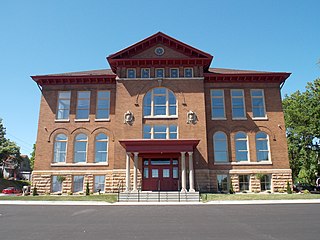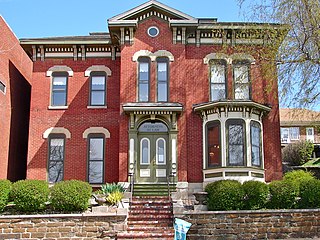
The Harvest Time Family Worship Center, is a historic building that houses a Pentecostal congregation located in Davenport, Iowa, United States. It was added to the National Register of Historic Places in 1984 as the First Church of Christ, Scientist.

St. Joseph Catholic Church is a former Catholic parish in the Diocese of Davenport. Its former parish church is located in the west end of Davenport, Iowa, United States. It was listed on the National Register of Historic Places in 1983. The church and the rectory were listed together on the Davenport Register of Historic Properties in 1999. After serving as the location of a Reformed Baptist congregation and a private elementary school named Marquette Academy, the parish property now houses a fundamentalist Christian ministry named One Eighty.

The Kahl Building is an historic building located in Downtown Davenport, Iowa, United States. It was listed on the National Register of Historic Places in 1983. In 2020 it was included as a contributing property in the Davenport Downtown Commercial Historic District. The building also includes the Capitol Theatre.

St. John's United Methodist Church is located in central Davenport, Iowa, United States. It was listed on the National Register of Historic Places in 1983.

First Baptist Church is located in central Davenport, Iowa, United States. It was listed on the National Register of Historic Places in 1983 as Calvary Baptist Church/First Baptist Church. It is affiliated with American Baptist Churches USA.

The former Swedish Baptist Church is a historic building located on the east side of Davenport, Iowa, United States. The congregation was organized in 1883 in the city's Swedish neighborhood and included about 50 people. The building was originally a Presbyterian Church and was moved here from its original location at Eleventh and Scott Streets. In the 1920s it became Second Baptist Church and by the 1930s it was renamed Grand Avenue Baptist Church. The building subsequently housed other denominations, including the Mennonites, and now houses Kingdom Generation Church.

The LeClaire Park Bandshell, also known as the W.D. Petersen Memorial Music Pavilion, is located on Beiderbecke Drive in LeClaire Park, Davenport, Iowa. It was listed on the National Register of Historic Places in 1983 and on the Davenport Register of Historic Properties in 1993.

The former First Bible Missionary Church, located in the West End of Davenport, Iowa, United States, is an historic structure listed on the National Register of Historic Places. The building was built as a Congregational Church.

Pierce School No. 13 is a historic building located on the east side of Davenport, Iowa, United States. Pierce School Lofts, as the building is now called, contains 41 market-rate apartments. It was included as a contributing property in the Village of East Davenport Historic District in 1980. The building was individually listed on the National Register of Historic Places in 1983.

Buchanan School, also known as The Naval Station, is a historic building located in the West End of Davenport, Iowa, United States. It was listed on the National Register of Historic Places in 1983. Since 2019 the building has housed a senior living apartment building.

Taylor School is a historic building located in Davenport, Iowa, United States. The former grade school was listed on the National Register of Historic Places in 1983 and on the Davenport Register of Historic Properties in 2005.

The Cork Hill District is a nationally recognized historic district located in Davenport, Iowa, United States. It was listed on the National Register of Historic Places in 1984. The historic district covers 18.7-acre (7.6 ha) and stretches from the campus of Palmer College of Chiropractic on the west to the Sacred Heart Cathedral Complex on the east. It is the western half of a neighborhood of the same name. When listed, the district included 12 contributing buildings. It includes Greek Revival, Italianate, and Victorian architecture. The district was covered in a 1982 study of Davenport Multiple Resource Area and/or its 1983 follow-on.

The Kimball–Stevenson House is a historic building located just north of downtown Davenport, Iowa, United States. It was built in 1873 and it has been listed on the National Register of Historic Places since 1983.

The E.P. Adler House is a historic building located in the central part of Davenport, Iowa, United States. It has been individually listed on the National Register of Historic Places since 1983. In 1984 it was included as a contributing property in the Vander Veer Park Historic District. It has been on the Davenport Register of Historic Properties since 2008.

St. Paul Lutheran Church is located in central, Davenport, Iowa, United States. It is affiliated with the Evangelical Lutheran Church in America (ELCA). The church's original property, which subsequently housed other Protestant congregations, was listed on the National Register of Historic Places in 1983, but has since been torn down. The present complex was built in 1952 and contains two buildings that are contributing properties in the Vander Veer Park Historic District. The present church building was completed in 2007.

Argyle Flats is a historic building located on a busy thoroughfare in Davenport, Iowa, United States. It was listed on the National Register of Historic Places in 1983.

The John Schricker House is a historic building located in the far West End of Davenport, Iowa, United States. The house has been listed on the National Register of Historic Places since 1985.

This is intended to be a complete list of the properties and districts on the National Register of Historic Places in Downtown Davenport, Iowa, United States. Downtown Davenport is defined as being all of the city south of 5th Street from Marquette Street east to the intersection of River Drive and East 4th Street. The locations of National Register properties and districts may be seen in an online map.
Frederick George "Fritz" Clausen (1848–1940) was a Danish-born architect who came to the United States in 1869 and founded an architectural practice in Davenport, Iowa. The firm that he founded, presently named Studio 483 Architects, is still in business today, the oldest firm in continuous practice in the state of Iowa. Clausen has been termed the "premier 19th century architect" of Davenport, Iowa.
Gustav A. Hanssen was an American architect. He designed private residences in Davenport, Iowa and later moved to San Diego, California. Several of his buildings are listed on the National Register of Historic Places (NRHP).






















